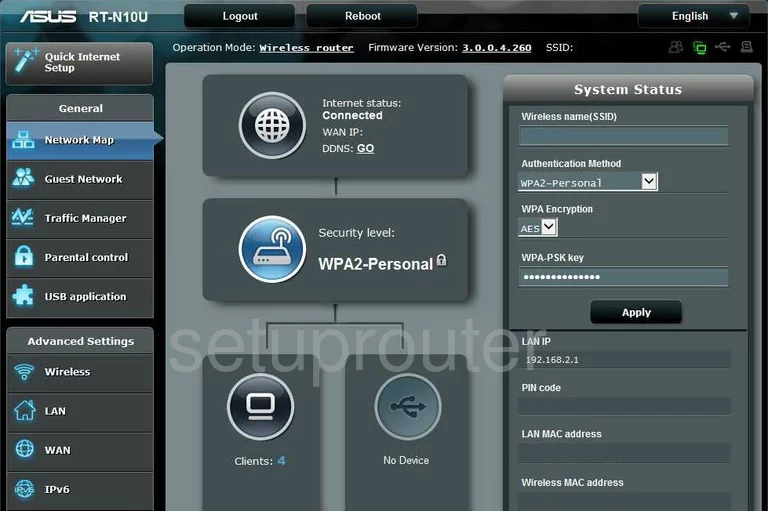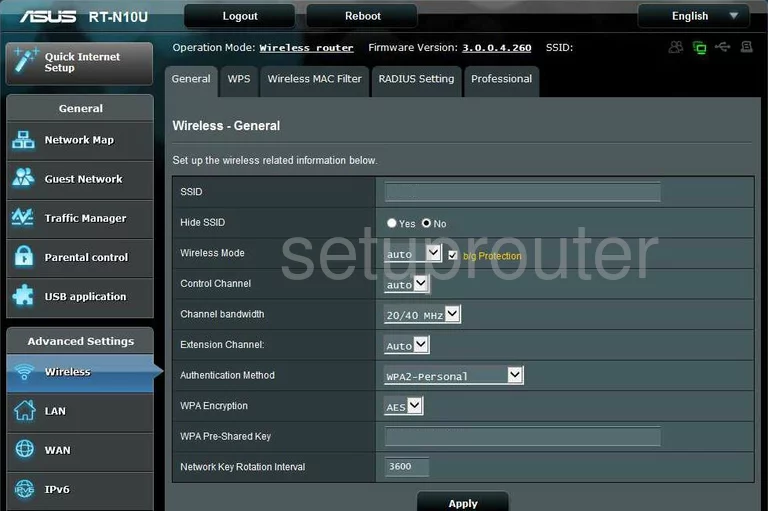The Asus RT-N10U router is considered a wireless router because it offers WiFi connectivity. WiFi, or simply wireless, allows you to connect various devices to your router, such as wireless printers, smart televisions, and WiFi enabled smartphones.
Other Asus RT-N10U Guides
This is the wifi guide for the Asus RT-N10U. We also have the following guides for the same router:
- Asus RT-N10U - Asus RT-N10U User Manual
- Asus RT-N10U - How to change the IP Address on a Asus RT-N10U router
- Asus RT-N10U - Asus RT-N10U Login Instructions
- Asus RT-N10U - Asus RT-N10U Port Forwarding Instructions
- Asus RT-N10U - How to Reset the Asus RT-N10U
- Asus RT-N10U - Asus RT-N10U Screenshots
- Asus RT-N10U - Information About the Asus RT-N10U Router
WiFi Terms
Before we get started there is a little bit of background info that you should be familiar with.
Wireless Name
Your wireless network needs to have a name to uniquely identify it from other wireless networks. If you are not sure what this means we have a guide explaining what a wireless name is that you can read for more information.
Wireless Password
An important part of securing your wireless network is choosing a strong password.
Wireless Channel
Picking a WiFi channel is not always a simple task. Be sure to read about WiFi channels before making the choice.
Encryption
You should almost definitely pick WPA2 for your networks encryption. If you are unsure, be sure to read our WEP vs WPA guide first.
Login To The Asus RT-N10U
To get started configuring the Asus RT-N10U WiFi settings you need to login to your router. If you are already logged in you can skip this step.
To login to the Asus RT-N10U, follow our Asus RT-N10U Login Guide.
Find the WiFi Settings on the Asus RT-N10U
If you followed our login guide above then you should see this screen.

This guide begins on the Network Map of the Asus RT-N10U router. To configure your WiFi settings, click the link on the left labeled Network Map. Then, at the top of the page click General.
Change the WiFi Settings on the Asus RT-N10U

You should now be on the page you see here. The first thing you need to change is the SSID. The SSID is the name you give your network so you can identify it from the others around you. Create an original network name but avoid using any personal information in it. For a more detailed description of what this is, check out our guide titled Wireless names.
Just below that is the Hide SSID. This is asking if you want your network name to be visible. If you leave it at the default of No then your network is visible to the surrounding networks. If you choose to click the Yes button, it becomes invisible to the surrounding networks, but not to a hacker who has all the tools needed to scan for networks hidden or not.
The next thing you need to look at is the Channel. Here in the United States there are 11 channels you can choose from. Of these 11 channels there is only room in the spectrum for three channels that do not overlap each other, channels 1,6, and 11. You need to be using one of these three channels. For more information on the reasons why, check out our guide titled WiFi channels.
Then, below that find the Authentication Method. This is the type of security you want to use. There are several different choices and the guide WEP vs. WPA is a great guide on the subject. We recommend using WPA2-Personal for your home network.
Now that you have chosen the type of authentication, what type of WPA Encryption do you want to use. We recommend using AES. This is the strongest and newest choice available.
Last of all is the WPA Pre-Shared Key. This is the password you use to access the network. It is extremely important that you create a strong password of at least 20 characters here. We suggest avoiding any personal information here. Dictionary words should also be avoided. We do recommend using some symbols, capital letters, and numbers in the password. For help in creating a strong but memorable password, check out our guide titled How to choose a strong password.
That's it, nothing else on this page needs to be changed. Just click the Apply button when you are finished.
Possible Problems when Changing your WiFi Settings
After making these changes to your router you will almost definitely have to reconnect any previously connected devices. This is usually done at the device itself and not at your computer.
Other Asus RT-N10U Info
Don't forget about our other Asus RT-N10U info that you might be interested in.
This is the wifi guide for the Asus RT-N10U. We also have the following guides for the same router:
- Asus RT-N10U - Asus RT-N10U User Manual
- Asus RT-N10U - How to change the IP Address on a Asus RT-N10U router
- Asus RT-N10U - Asus RT-N10U Login Instructions
- Asus RT-N10U - Asus RT-N10U Port Forwarding Instructions
- Asus RT-N10U - How to Reset the Asus RT-N10U
- Asus RT-N10U - Asus RT-N10U Screenshots
- Asus RT-N10U - Information About the Asus RT-N10U Router